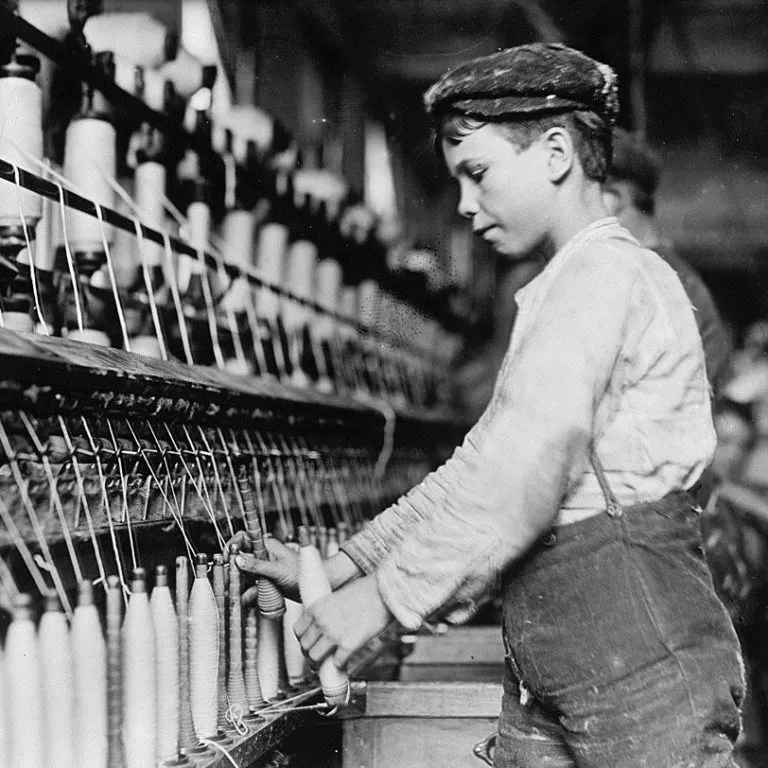
Robert was seven years old when he was hired to work in a cotton factory. He was glad that a new life awaited him - he imagined that everything would be better than a sad existence in the shelter. However, the very first day made him realize how wrong he was. What awaited the young man who began his "professional career" in 1799?
It's five in the morning. Children enter the factory. The first thing Robert hears is a clatter. Like a herd of horses or a thousand carts rushing on the cobblestones. But even carts don't need that much grease - the air feels thick with it. The noise is deafening, the vapors almost burn.
Get on your knees and crawl
There were so many looms stuffed in the hall that there was not even a piece of free space left. The boys squeeze between the machines. The foreman pulls Robert to his side and shows him what he will be doing: on his knees and crawling. When a piece of cotton falls to the floor, go under the loom and pull it out. Simple, any child can do it.
Machines spin, rise, fall with a thousand wheels and wajch. Robert is gliding across the floor. She tries to cover her mouth with her hand, because the cotton is getting so dusty that it is hard to breathe. If he gets a cough attack under the loom, it's over. Eyes stinging, mouth dry. He grabs a scrap of raw material, retreats on all fours. Managed to. They didn't get him.
Again. He bends down, picks up, crawls, grabs, bends down. His back is starting to ache, he makes every move with difficulty. He sits down for a moment to rest. It takes no more than a minute for a foreman to see the new one lazy and get him back to work. Robert goes back to collecting. There is a break at twelve, the children leave the room. The air smells so beautiful, the bread is so tasty. After lunch, they return to the factory. Robert does what he is told.After twelve hours, he feels that he can not stand it anymore ... A few years later, in 1802, the British Parliament will introduce a law prohibiting child labor over twelve hours a day and at night. At the same time, it will impose the obligation to ventilate and clean factory halls and teach young workers the basics of counting, reading and writing. Sir Robert Peel, the originator of the law, particularly insisted on airing the hall, because in his own factory most of the kids died of some kind of fever. Probably from bad air, after all, who was not afraid of miasms in these times.
"Do your job well and you won't be beaten"
However, so far it is only 1799, and besides, few people will comply with the act, because the parliament did not come up with the idea of sending inspectors who could check whether the regulations were violated. Hardly anyone knows what the working conditions in factories look like, even the owners often look after the business only from behind a desk. So despite his horrible exhaustion and the conviction that after twelve hours he can do nothing more, Robert works the thirteenth, and two-fifteenth, and three-fifteenth hours.
Some boy is sleeping on the floor. He no longer even hears the rumble of the looms, he no longer hears them. When the foreman lets go out, Robert is barely dragging himself. Everything hurts him, but it only lasts a few days. Didn't you think he would always collect cotton scraps? Only the youngest children do this, and he is already seven years old. He's got used to the factory, knows what's where and knows the rhythm of work, so it's time for the next task. Now it will change the thread spools on the machines. He is given a wooden block on which he stands to reach the spinner.
He takes off the empty spools and puts on the thread spools. The machine is fast, from time to time Robert fails to catch a spool. The overseer yells, and Robert tries to show him by sign that he can't get any faster. He punches him on the head hard enough to make him feel, but not enough to make him hit the machine. He will get harder later, during the break. The worker throws in a few curses. They beat him too when he was little, and he quickly learned to work decently. Thanks to this, now he has a job and he earns money, and if he takes good care of these kids, he will stay here for a long time. He has standards, and he will earn as much as he earns himself and the boys he has under him.
Robert changes the spools and cries. It doesn't bother anyone - the roar of the machines drowns out everything anyway, so let it cry. His hands are shaking. Every time he fails to remove an empty spool, he gets hit in the head. After some time, the caretaker's hand goes numb, so he pours the boy with his shoe. The method probably works, because the little one is getting better and better. A few more weeks and he could be left alone with the spinners.
THIS STORY IS TRUE .
It's good that times have changed and children are not forced to work